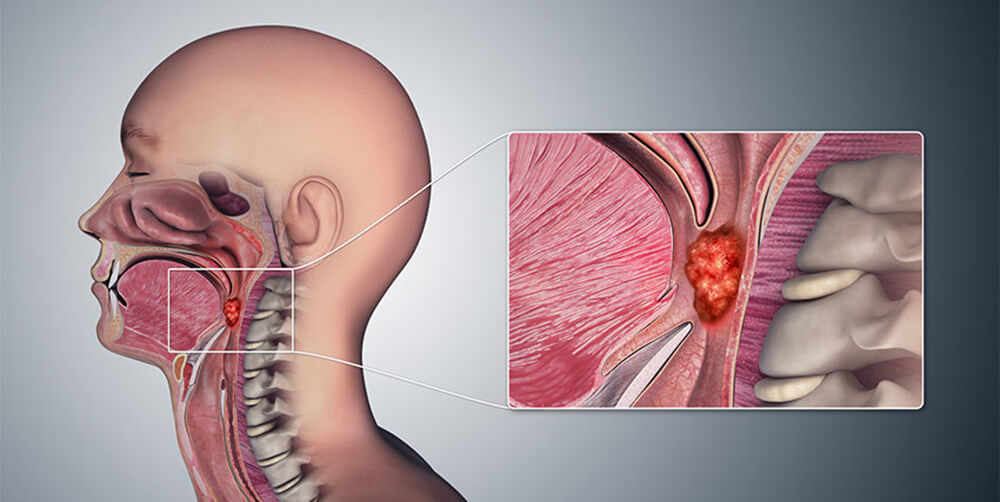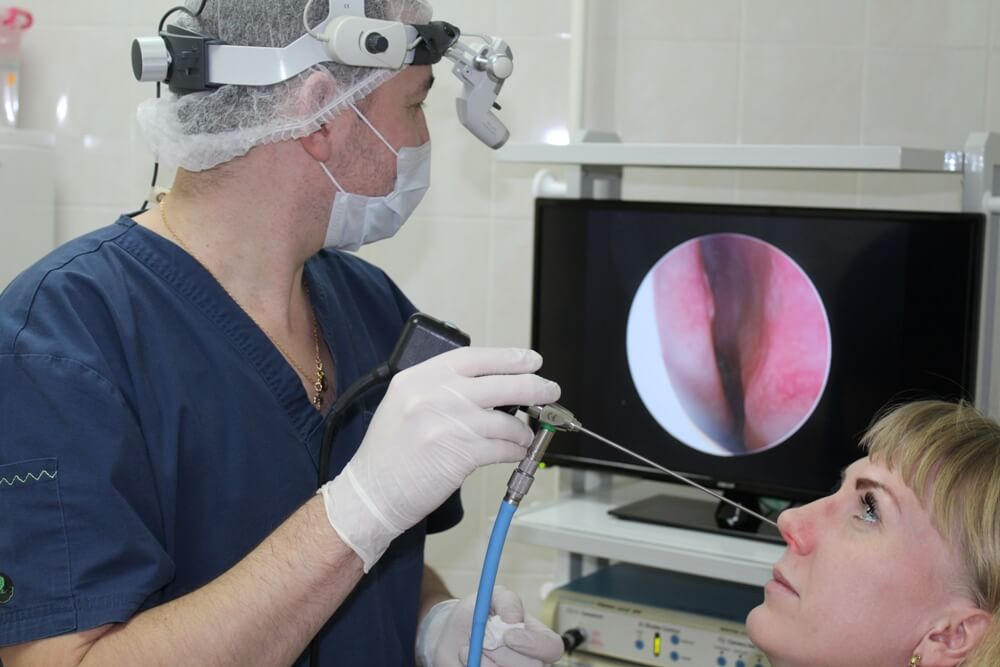Calls for Ukraine
Calls for Europe
Calls for USA

Nasopharyngeal cancer is a malignant tumor that develops in the upper part of the throat. In most cases (approximately 75%), malignancy in this area develops from epithelial cells. This cancer is called nasopharyngeal carcinoma. In addition, nasopharyngeal cancer can develop from glandular, connective and lymphatic tissue. This is a fairly rare disease. So, according to statistical data, the share of nasopharyngeal carcinoma among all oncological pathologies is approximately 0.25-1%; accordingly, other types of nasopharyngeal cancer are even less common.
Due to the fact that signs of nasopharyngeal cancer in the early stages of development can be mistaken for symptoms of acute respiratory viral infection, in 80% of cases this tumor is detected in late stages. Moreover, in 30% of cases, when doctors diagnose this type of cancer, patients already have distant metastases, which significantly complicates treatment. In such a situation, it is very important to go to specialized clinics with qualified doctors who can correctly assess the condition and select the most effective therapy taking into account the current condition.
The causes of the pathology currently remain unclear. It is assumed that its development is associated with such factors as:
Nasopharyngeal carcinoma is 10 times more common in men. Most often, the pathology is diagnosed in children or over the age of 50 years.
The rate of development of the disease largely depends on the type of tumor. In some aggressive forms, a few months are enough for the condition to become severely complicated. Therefore, if you suspect nasopharyngeal cancer, you should consult a doctor as soon as possible and get examined.

In the initial stages, the disease does not manifest itself clinically. As the tumor grows, the following symptoms begin to appear:
The first symptoms of nasopharyngeal cancer can be mistaken for a sluggish, long-lasting respiratory disease. In later stages of tumor development in the nasopharynx, a sign that a person has cancer rather than inflammatory disease of the upper respiratory tract is Trotter syndrome. It is characterized by simultaneous unilateral pain in the ear, jaw and tongue.
Doctors distinguish between types of pathology depending on what tissue they developed from:
In some cases, tumors are diagnosed, the development of which involves several types of nasopharyngeal tissue.
In its development, nasopharyngeal cancer goes through the following stages:
Life expectancy for nasopharyngeal cancer can vary. This depends on many parameters, such as the stage of the disease, the location of the tumor, as well as the correctness of the selected treatment.
The more accurately the diagnosis is made and the characteristics of the pathology are determined, the greater the opportunity to find effective tactics to combat the disease. In addition, the likelihood of living longer increases markedly when using innovative treatment methods, such as targeted therapy and immunotherapy.
In the early stages, nasopharyngeal carcinoma can be treated quite well. With timely consultation with a doctor, survival of more than 5 years is observed in more than 80-90% of cases. If the lymph nodes are affected, the success of treatment may decrease. However, even with stage 3-4 nasopharyngeal cancer, the prognosis can be quite good. Five-year survival is observed in approximately 30-50% of cases. If the latest treatment methods are used, the chances of defeating the disease will increase.

The rather rare occurrence of this pathology and the fact that its symptoms in the first stages of development are similar to the symptoms of ARVI is the reason why in the early stages it is often ignored not only by patients, but also by doctors. However, this neoplasm can be detected in the early stages of development using fairly simple techniques:
Also, if a tumor is detected in the nasopharynx, doctors may prescribe a CT or MRI. These studies help to see how far the tumor has spread and identify metastases.
Of particular importance in the diagnosis of malignant diseases is the precise determination of the type of neoplasm and its characteristics. For this purpose, special genetic testing has recently been used. Certain tests detect genetic mutations in cancer cells. In this way, it is possible to determine the molecular profile of the cancer. This is very important, as it allows doctors to improve treatment tactics. Using the information obtained will help oncologists select drugs that will specifically target tumor cells.
Genetic diagnostics can be done in specialized laboratories, where specialists do molecular profiling for different genes, which allows research to be carried out for various types of malignant diseases. In this way, it is possible to obtain valuable information about the disease and apply a personalized approach when choosing treatment tactics.
To learn about the possibilities of assessing the molecular profile of cancer, contact the MedTour coordinating doctor.
Treatment tactics for nasopharyngeal tumors are selected by doctors individually for each patient. Different types of neoplasms have their own treatment characteristics. Most often, nasopharyngeal cancer is treated using standard methods: removal of the tumor, radiation therapy and chemotherapy. In addition, new effective methods have recently appeared, primarily targeted therapy and immunotherapy.

Surgery is usually performed laparoscopically, with doctors removing the tumor through the nose. In the first stages, surgery completely eliminates the tumor. However, in later stages, it is not always possible to remove all cancer cells. In this case, doctors may additionally use other methods or surgery may not be performed at all.
Quite often, when choosing a treatment method, oncologists give preference to radiation therapy, or radiation therapy is combined with chemotherapy. During radiotherapy, ionizing radiation affects the tumor. Radiation therapy for nasopharyngeal cancer can be represented by classical radiotherapy. Radioactive elements can also be injected into the nasopharynx.
Another method of radiation therapy is stereotactic surgery (CyberKnife). This is a modern method that involves high-precision irradiation of a tumor with large doses of radiation, which is more effective. At the same time, due to the precise determination of the impact zone, healthy tissues remain unaffected.
Chemotherapy for nasopharyngeal tumors is often prescribed together with radiation therapy or surgery. This combined use can significantly improve treatment results and reduce the number of relapses. However, a serious disadvantage of chemotherapy is its side effects. When chemotherapy drugs are introduced into the body, they have a toxic effect not only on cancer cells, but also on healthy ones, which can significantly worsen the patient’s overall health.
Targeted therapy is a relatively new method that demonstrates high effectiveness in the treatment of many types of malignant diseases. It is a type of chemotherapy. However, in this case, chemotherapy is used for treatment, which has a targeted effect on cancer cells, while healthy cells are practically not affected. Unfortunately, at the moment, effective targeted drugs have not yet been found for all types of cancer, but work in this direction is constantly being carried out, and new achievements appear every day.
Targeted therapy drugs vary for different types of cancer and must be individualized. To do this, it is necessary to carry out special diagnostics, which will allow the oncologist to choose the correct treatment protocol.
Contact the MedTour coordinating doctor. The medical coordinator will advise you free of charge and recommend a medical facility where they will help you choose effective targeted drugs for cancer treatment.

Immunotherapy uses the body’s own immune system to fight cancer. One of the most promising areas of immunotherapy is the development and use of cancer vaccines. Doctors and scientists are actively working to create such vaccines, and there are already options that show their effectiveness.
The use of cancer vaccines helps improve treatment rates and increase the chances of recovery. You can get a cancer vaccine in Ukraine, Turkey, Germany, and the Czech Republic. Contact the MedTour coordinating doctor to learn more about vaccination opportunities.
In order for cancer treatment to be productive, you need to contact specialized clinics and centers that specialize in pathologies of your type. On the MedTour platform you can find the best clinics for the treatment of nasopharyngeal tumors.
On our website there is a list of medical institutions that deal with this problem. To find out more information on clinics, treatment options in different countries, and cost of services, contact our coordinating doctor.
Would you like to find a highly qualified specialist in the treatment of nasopharyngeal cancer? Contact our medical coordinators for help. They will help you choose a specialist free of charge, taking into account your needs and health conditions. We work with the best doctors from around the world who use the latest treatment methods, have a good reputation and extensive experience in treating cancer.
Please rate the work of MedTour
